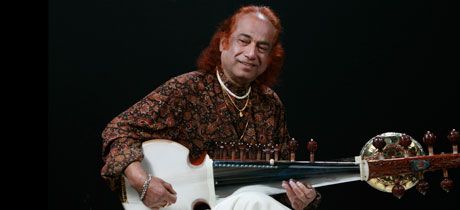| « Re-live NYE 2009 With Girl Talk | Notes on Shonen Knife's performance @ Schubas, 9/21 » |
Concert Wed Sep 22 2010
The Legacy Continues

Master sarod player Aashish Khan
I have before me an awesome and difficult task. How do I convince you to spend fifteen of your hard-earned Recession-era dollars and brave downtown traffic for an early-evening performance on a Friday by a pair of Indian classical musicians who aren't Ravi Shankar? How do I convince you, adventurous listener who might be tempted to check out some shows at the Chicago World Music Festival this weekend but aren't sure which ones, to make attendance of this particular performance more crucial than Pavement at Pritzker, Rolling Stones at the Aragon, and Funkadelic at the Taste combined? I don't know, but I hope it works out, because it really is that big.
This Friday (September 24), the Chicago World Music Festival 2010 welcomes Aashish Khan and Swapan Chaudhuri to the Chicago Cultural Center (78 E. Washington St.) in the Preston Bradley Hall. Tickets are $15, and can be ordered from this page.
Now, on to the matter of why you must be here.
First of all, to appreciate what a huge concert this is, we have to explain why Indian classical music ("Raga," if you like, though the term doesn't quite cover the whole span of music) sounds like it does at this place in time, the reason (and I am simplifying things a bit, but not too much) why you think of Ravi Shankar just WAILING on "Rag Bhimpalasi" at Monterey, epic solos and blazing tablas and escalating ecstasy and hippes just losing their minds, etc. The reason, simply, is Allauddin Khan.
Born in 1881, Padma Vibhushan Allauddin Khan Sahib lived his whole life immersed in his music, and exists in the history of modern Indian classical music as a Cronos-like figure (the Greek god, not the lead singer of Venom), birthing many of the most legendary and influential Indian classical musicians of the 20th century directly from his forehead. Stories of his intense study of music abound -- Ravi Shankar says that when Allauddin Khan was a young man, he would tie his long ponytail taut to the ceiling so that he could play for 18 or more hours at a time...the hair was tied so rigidly to the ceiling, his head couldn't nod down for sleep. He supposedly ran from an arranged marriage in order to continue his studies! He also studied Western music and took violin lessons, imbuing him with a deep love of music traditions from all over the world. This sounds fairly commonplace in this day and age, but this was in a time when Indian classical music was rigidly carried down from generation to generation with little to no new ornamentation, often secretly and only through court musicians for the purpose of entertaining royalty.
At the start of the 20th century, ragas ran about the length of your average blues song, at least for recording purposes -- the 78s that document the early recordings have the musicians blowing through the alap (beat-less instrumental intro) in 20 seconds or less. But it wasn't just the recording medium, it was the style at the time. Under Allauddin Khan's tutelage, Indian classical music forms (especially the northern region's Hindustani musics, as opposed to the Carnatic traditions in the south) began to grow and change. By absorbing influences from the West, expanding the musical language of many instruments (Allauddin Khan was an accomplished multi-instrumentalist), and writing a considerable number of now-classic ragas, Allauddin Khan's presence looms large over not just Hindustani music, but Westerners' conception of what it sounds like. The performances got longer, instrumental techniques became more complex, and there was more emphasis given to extended improvisations.
Then there's the students. Allauddin Khan is the father of the late Ali Akbar Khan, generally considered to be one of the premier virtuosos of the sarod, and taught him rigorously, expanding his own knowledge into his spectacularly talented son. Allauddin and Ali Akbar Khan taught two of the most most accomplished and, it must be said, famous sitar players of all time, Ravi Shankar and Nikhil Banerjee. (The sharply contrasting styles of Shankar and Banerjee were deliberate, as Allauddin Khan said he wanted to take each student to the furthest point of two completely different paths to sitar mastery) He also taught his daughter, the great surbahar player Annapurna Devi, bansuri player Pannalal Ghosh, sarod player Bahadur Khan, and so many others. Each of these musicians on their own is a major force in Indian classical music. That so many studied under one man is borderline incomprehensible.
Continuing the tradition, Ali Akbar Khan (along with Ravi Shankar, Nikhil Banerjee and others) brought the East to the West, popularizing a music that, at first blush, seems so structurally opposed to our conceptions of 'beautiful' music. His sarod playing was without peer, a high-energy marshaling of musical forces that sounds like it was played by a man with four hands.
Ali Akbar Khan passed away last year, but his son, the sarod virtuoso Aashish Khan, continues to pass the tradition on to new listeners and students. Playing his first concert alongside his grandfather at age 13, Aashish Khan has fused elements of traditional Hindustani classical music with rock elements in the group Shanti, alongside world-famous tabla player Zakir Hussein. He has numerous CDs of traditional Hindustani classical music in print, and has composed and performed on many film soundtracks, including the soundtrack to Richard Attenborough's Ghandi. I last saw Aashish Khan in Chicago around 2003, and the depth of emotion and musical discipline was extraordinary.
Accompanying him is tabla master Swapan Chaudhuri, a percussionist and instructor without peer in our times. He's an absolute master, his fingers dancing over the heads of the tabla like nimble hummingbirds, his open strokes ringing out like bells. If you've purchase any of the great Nikhil Banerjee live recordings offered by Raga Records, you've likely heard Chaudhuri many times, and his skills and dedication to his instrument have only grown in the past three decades. Check out this clip of Chaudhuri solo, and listen to the sound of your jaw hitting the floor when you realize that no part of this clip is in any way sped up with camera tricks. He really is that fast and that precise:
(in the interest of full disclosure, I studied tabla under one of Chaudhuri's students, Ben Harbert, at the Old Town School of Folk Music for two years. I might be a little biased. Ya think?)
Aashish Khan and Swapan Chaudhuri pay tribute to Ustad Allauddin Khan and Ustad Ali Akbar Khan this Friday. Whether you are a battle-hardened Indian classical music afficianado who can name that raga in only five notes, or a newcomer who's just looking for a taste of something different, I hope you now see that this event must not be missed.
Here's a performance between Aashish Khan and Swapan Chaudhuri from last year to get you in the mood.















